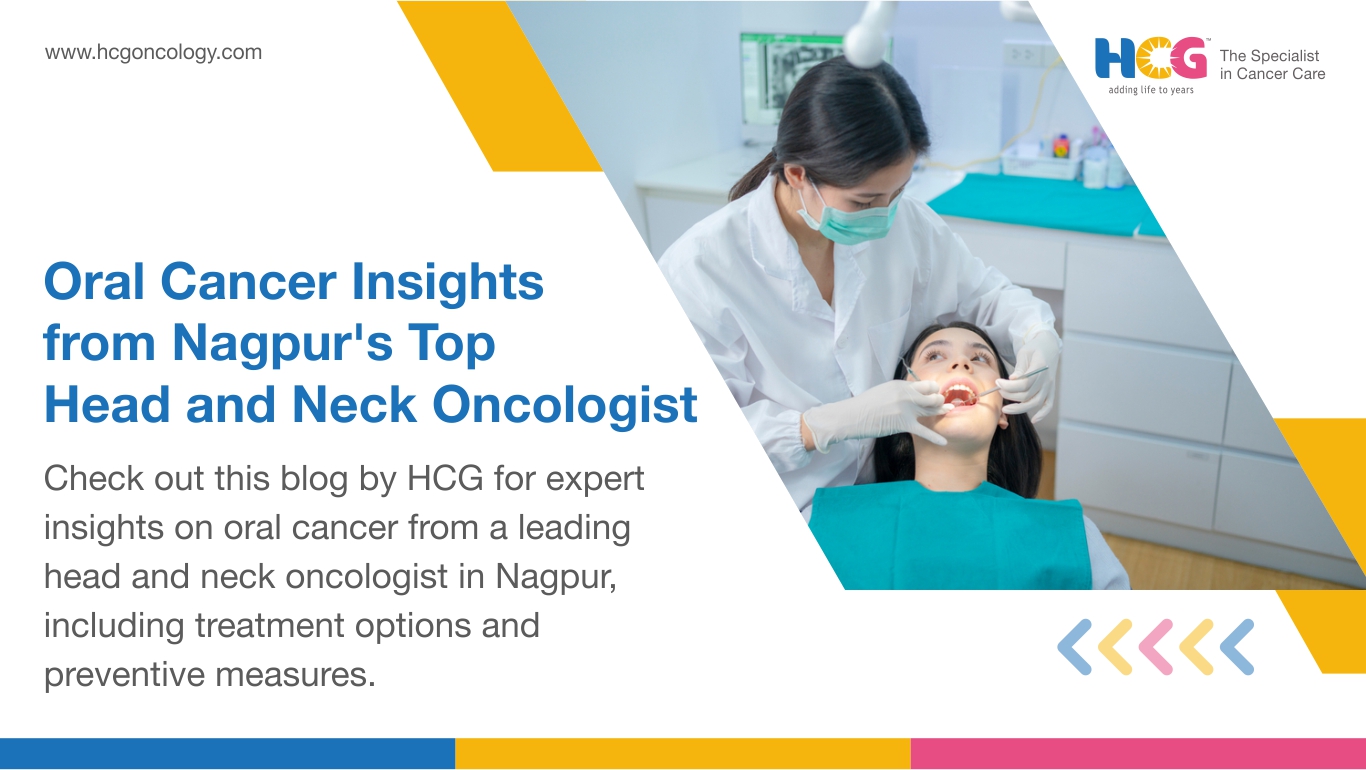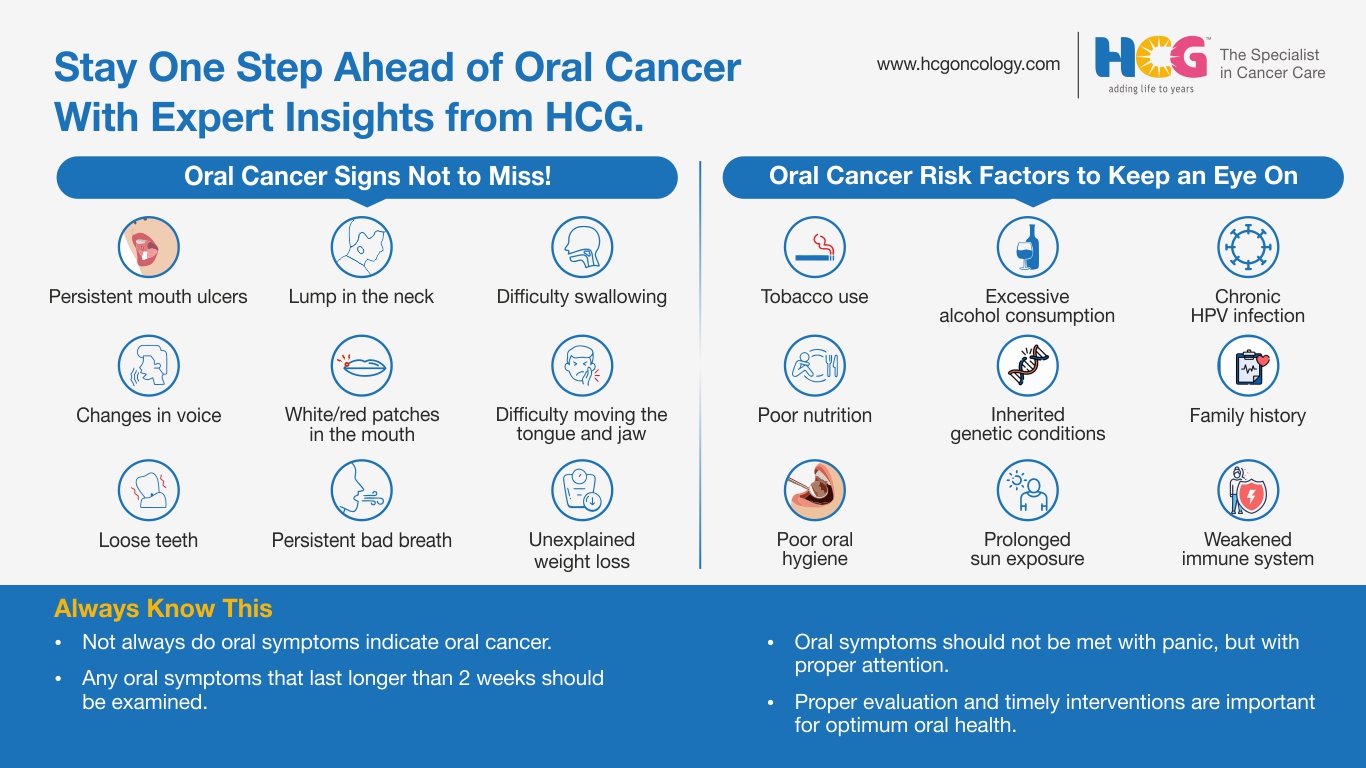
02 Dec, 2025
Feel free to reach out to us.

02 Dec, 2025

This article is medically reviewed by Dr. Bhaskar Singh, Consultant - Surgical Oncology, HCG Cancer Centre, Nagpur.
Do you know which is the "Oral Cancer Capital of the World?"
The answer might surprise you. It is India. In our country, oral cancer is the most common cancer among men, and among women, it is the third most common cancer.
Oral cancer, or mouth cancer, is a type of head and neck cancer that affects the tissues of the mouth and oral cavity. It occurs when cells present in the mouth or throat region start dividing abnormally and form a tumor.
Although treatable, this condition can be life-threatening if it is not diagnosed in the early stages and managed appropriately.
57.5% of the world’s oral cancer cases are reported in India. The average age for an oral cancer diagnosis in our country is around 50.
Another shocking observation is that about 60–80% of oral carcinoma patients see a doctor in the advanced stage. This could also be one of the contributing factors to the poor 5-year survival rates for oral carcinoma in India.
Another contributing factor to the increased oral carcinoma incidence is the lack of awareness among our country's population.
A survey found that a large percentage of participants did not know that cancer could occur in the head and neck region, and the most common cause is tobacco. Therefore, in the case of oral cancer, it is not just the incidence that is alarming, but also the ignorance.
There are different types of oral cancer based on the location of the cancer. Oral carcinoma can occur in different parts of the mouth, including:
The appropriate diagnosis of oral carcinoma is of paramount importance. The subsite where cancer begins can impact treatment planning and disease prognosis significantly.

Early diagnosis and timely treatment are imperative for successfully managing oral cancers. Therefore, individuals must be aware of the different symptoms of oral cancer and seek immediate medical attention when any symptom lasts for more than two weeks.
Some of the common symptoms associated with oral cancer include:
These symptoms do not always point towards cancer, as they are associated with other, less severe health conditions as well. Therefore, it is important to see a doctor for a confirmed diagnosis. Patients should consult the doctor if they experience early signs and symptoms of oral cancer.
Some of the common causes of oral cancer include:
Tobacco use is one of the most common causes of oral cancer (click on the link to learn about the lesser-known causes of oral cancer).
It has been reported that smoking tobacco in any form increases the risk of oral cancer 2 to 10 times in both men and women. The risk of oral carcinoma further increases with the duration and frequency of using tobacco.
The presence of oral carcinogens in tobacco, including tobacco-specific N-nitrosamines, such as N-nitrosonornicotine, makes it one of the biggest risk factors for oral carcinoma.
Excessive alcohol consumption also causes oral cancer. Studies reported an increased risk of oral carcinoma by two to sixfold in people who consume alcohol in higher amounts.
The use of alcohol with tobacco smoking further increases the risk of oral cancer.
Several underlying mechanisms cause oral carcinoma because of alcohol consumption, such as altered cell permeability, direct effect on the cell membrane, altered liver function, and variation in enzymes metabolizing alcohol.
HPV infection is also an independent cause of oral cancer, especially cancer of the base of the tongue. The strains of HPV that are usually involved in causing oral carcinoma are HPV 16 and 18.
The infection is generally transmitted through sexual or oral contact. The oral cancer prevention measures (due to HPV infection) include vaccination and practicing safe sex.
Another cause of oral cancer is hematopoietic stem cell transplants. Patients undergoing this procedure are at a 4 to 7 times increased risk for oral carcinoma.
The initial stage of malignancy is the graft-versus-host disease in the oral cavity. Some of the common symptoms include xerostomia, mucositis, and lichenoid changes. The salivary gland and tongue cancers usually occur within 5 to 9 years post-transplant.
Poor nutrition, along with other causes, increases the risk of oral cancer. It has been reported that a diet rich in fruits and vegetables reduces the risk of oral cancer by 40 to 50%.
The liver's cytochrome P450 system metabolizes several carcinogens. Polymorphisms in the system increase the risk of various cancers, especially head and neck cancers. However, the risk of developing oral carcinoma because of this polymorphism is lower (1.5 times).
Mouth cancer may also be caused by polymorphisms in alcohol-metabolizing enzymes, such as alcohol dehydrogenase.
Other possible causes of oral cancer include sharp teeth, ill-fitting dentures, poor oral hygiene, and sun exposure.
First, the doctor will perform a physical exam. This includes closely examining the roof and floor of the mouth, the back of the throat, tongue, and cheeks, and the lymph nodes in the neck. If there is a growth or suspicious lesion, it will be advised.
A tissue biopsy will be advised to involve removing a piece of the tissue so it can be examined under a microscope for cancerous cells.
In addition, the doctor may perform one or more of the following tests:
Oral cancer treatment will vary depending on the oral cancer type, location, and stage of cancer at diagnosis.
Cancer care is a multidisciplinary team approach that includes:
The primary modality for oral cancer treatment is surgery. It involves removing tumors from all sides with an adequate margin, which may require removing the entire or part of the jaws and lymph nodes from the neck. Advanced technologies like LASER, robots, microscopes, and high-precision saws are now available.
Radiation therapy involves aiming radiation beams at the tumor. It can be used after surgery or as a primary treatment with or without chemotherapy. The latest techniques, like IMRT, IGRT, and TomoTherapy-H, are available for delivering radiation for oral cancer to provide better results with minimum side effects.
Chemotherapy is a treatment where a specific drug is injected or given orally into the body that kills cancer cells. It is given before surgery to shrink the disease or after surgery with radiation. It can be an outpatient procedure, although some may require hospitalization.
People who are diagnosed with advanced oral carcinoma will likely need reconstructive surgery and some rehabilitation for aesthetic purposes and also to assist with essential functions like speech, swallowing, and chewing.
Different reconstruction options are now available, from local flaps to regional flaps to microvascular-free flaps. During this procedure, the portion of the mouth removed is reconstructed with skin, muscle, and bone taken from other parts of the body. This is done in a single stage, along with the surgery for cancer removal.
Rehabilitation involves dentures, dental implants, or a specific facial prosthesis to replace missing teeth and tissues in the mouth or face. An artificial palate (obturator) replaces any missing tissue or teeth in the upper jaw.
Rehabilitation is also necessary for cases of advanced cancer. Speech therapy can be provided from the time of the completion of surgery until the patient reaches the maximum level of improvement.
As one of the leading hospitals for cancer treatment in India, HCG Cancer Centre, Nagpur, is one of the most advanced centers for diagnosing and managing several cancers, including mouth cancers.
The center's modern diagnostic facilities allow for accurate and precise disease diagnosis. The center offers all the possible treatments for oral cancer. Further, the medical team, including the cancer specialist, cancer surgeon, radiologist, and dentist, provides customized care to the patients.
Tobacco is responsible for 95% of oral cancer cases. Early detection and treatment are the keys to better results. Visit your doctor at least once a year if you consume tobacco in any form. Self-examination of the oral cavity is very helpful.
At HCG, we have a dynamic team of cancer specialists who approach oral carcinomas with a multidisciplinary and patient-centric approach. We specialize in devising a personalized treatment plan for every cancer patient to ensure that we achieve the best possible clinical outcome. Cancer is nothing more than a chapter in each patient’s life.
The patient must pay attention to the warning signs of oral cancer, especially those at higher risk.

Dr. Bhaskar Singh
Consultant - Surgical Oncology
MBBS, MS (Surgery), FMAS, DNB (Surgical Oncology)
Dr. Bhaskar Singh is a highly skilled and experienced surgical oncologist at the HCG Cancer Centre, a leading oncology hospital in Nagpur. He specializes in the management of gynecological, breast, gastrointestinal, head and neck, orthopedic, and thoracic cancers. He is adept at performing both open and minimally invasive surgeries, based on the stage and other diagnostic parameters. Dr. Bhaskar emphasizes providing a patient-centric approach to treatment and strives to provide the best care and outcome for his patients.
To book an appointment with Dr. Bhaskar Singh, please click here.